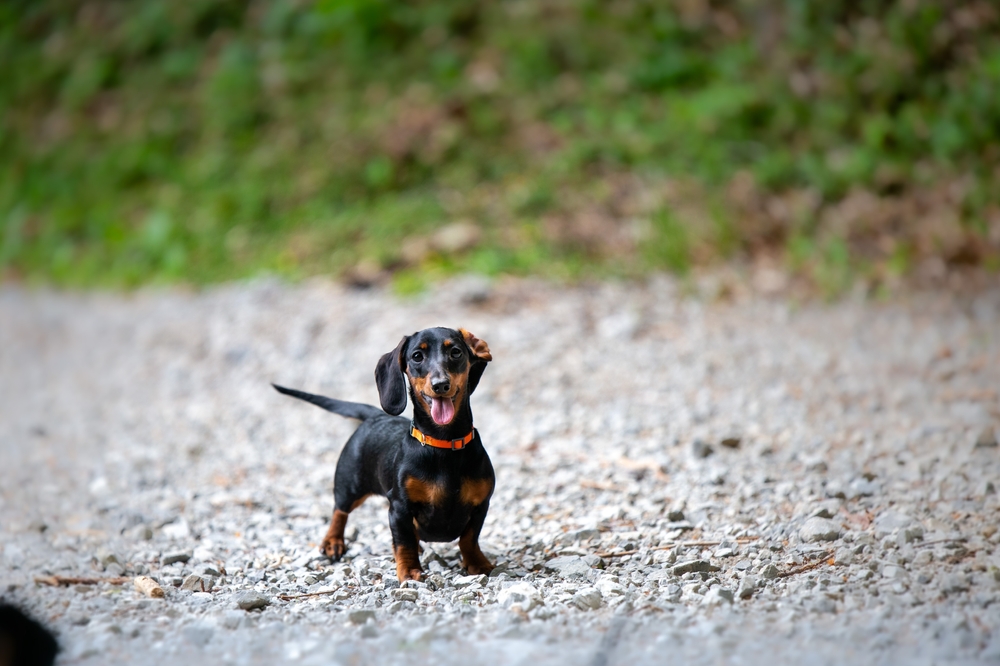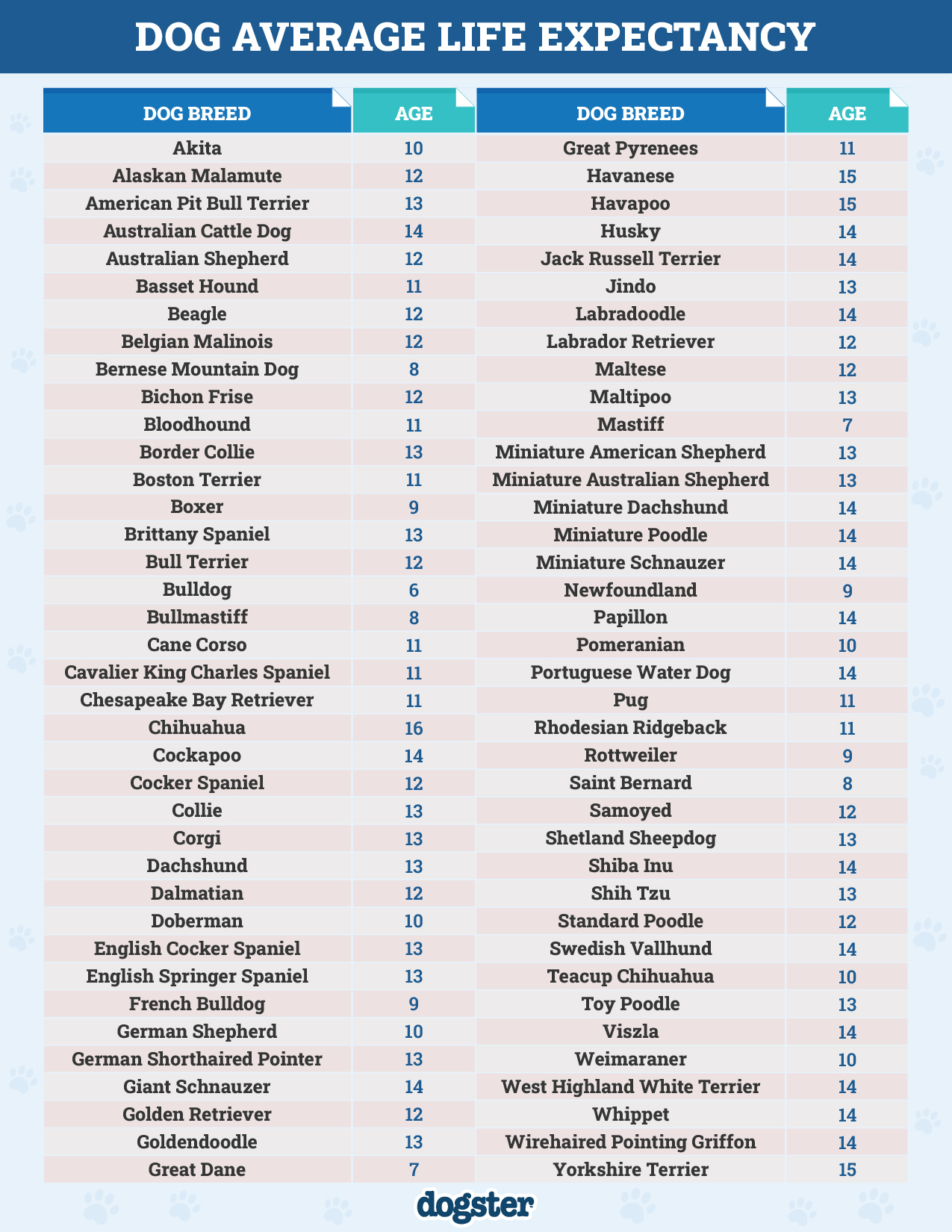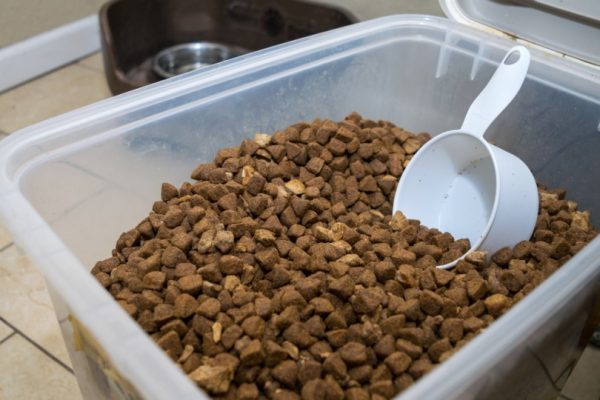In this article
View 2 More +There are a multitude of perks to parenting a Dachshund. Not only are they adorable, humorous dogs, but they’re also highly intelligent, spirited, and affectionate. In addition to all these fantastic personality traits, Dachshunds are generally healthy dogs with long lifespans of 12 to 16 years—as long as they’re properly cared for.
To maximize your Dachshund’s health and chances of living a long, happy life, it’s important to fulfill all their nutritional, physical, and mental needs. Other factors that determine a Dachshund’s health include breeding history, genetics, and the environment they’re kept in.
In this post, we’ll explore factors that influence a Dachshund’s lifespan and health.

What’s the Average Lifespan of a Dachshund?
A well-cared-for Dachshund can live for up to 16 years, with the average life expectancy being 12–16 years. Dachshunds are one of the longest-lived dog breeds, and they currently rank as eighth on PetMD’s roundup of the 21 longest-lived breeds.

Why Do Some Dachshunds Live Longer Than Others?
When it comes to determining a dog’s life expectancy, there are multiple factors at play. A Dachshund that is nurtured with species-appropriate food, a safe living environment, and, most importantly, lots of love has a better chance of living a long and healthy life. Let’s take a look at some of these factors in more depth.
1. Nutrition
Dogs need a balanced, complete diet containing protein, fat, carbohydrates, minerals, and vitamins. They also need access to fresh, clean water at all times. It’s important to feed your Dachshund quality food from a reputable brand and avoid giving certain kinds of human foods. Some human foods can be given as a treat, but some should be avoided altogether.
Human foods to avoid include (not an exhaustive list):
- Chocolate
- Processed foods
- Candy
- Chewing gum
- Garlic
- Caffeine
- Onions
- Alcohol
- Citrus
- Dairy products
- Nuts
- Potato chips
- Macadamia nuts
- Pecans
- Walnuts
- Grapes
- Raisins
Every pet is unique in their nutritional needs, so we recommend reaching out to a vet for nutritional advice.
If you need to speak with a vet but can't get to one, head over to PangoVet. It's our online service where you can talk to a vet online and get the personalized advice you need for your pet — all at an affordable price!

2. Living Conditions
Your Dachshund needs to live in a safe, warm, clean, and comfortable environment in order to thrive. This means dog-proofing your home to make sure they can’t get hold of toxic plants or chemicals and sealing escape routes or areas they may be able to fall from, like apartment windows.
Your home or apartment should be hygienic, warm (not damp), and mold-free, and your Dachshund needs to be away from consistent draughts. Their toilet area should also be kept clean. Your Dachshund should never live outside—outdoor dogs are at much greater risk due to weather conditions, getting sick, and suffering from stress and anxiety.
3. Care and Attention
Equally important as attending to a dog’s nutritional needs is to make sure they feel safe and loved and get daily walks and exercise. Failing to walk your Dachshund can result in anxiety, stress, and destructive behavior.
They also need to be mentally stimulated, so it’s a good idea to provide mentally challenging toys like puzzle feeders. These smart dogs don’t do well with boredom.
4. Size
Smaller dogs typically live longer on average than large dogs. This is because large dog breeds grow more and “wear out” more quickly than small dogs. Dachshunds are lucky in this regard, as their small size means they tend to outlive larger breeds.

5. Genetics and Breeding
Responsible breeders get their dogs screened for genetic conditions that may affect their puppies before they choose to breed. Irresponsible and unethical breeders skip this step and don’t care about the consequences. Some don’t realize what a big deal breeding is and how many responsibilities come along with it.
6. Healthcare
When you get your Dachshund, it’s important to get them signed up with a good vet quickly and arrange any vaccinations or procedures they may need (spaying/neutering, deworming, microchipping, etc.). It’s also crucial to make sure you’ll always be able to get your Dachshund access to medical treatment should they need it—this could mean setting money aside for emergencies or getting pet insurance to cover unexpected illnesses or accidents.
For healthy Dachshunds, it’s generally recommended to get them checked out by a vet at least once per year to make sure they’re doing well. Puppies need to visit the vet more regularly to get their shots and other routine procedures.
On that note, Dachshunds that aren’t microchipped or vaccinated are more likely to not fulfill their full life expectancy potential because it’s harder to reunite them with their owners if they go missing and they may contract a deadly illness.

7. Prevention & Awareness
I think we can all agree that the short legs and long backs of the Dachshund is what makes them so special. However, this is also what makes them more susceptible to developing intervertebral disc disease. Prevention is key, and keeping them from jumping up and down sofas and beds is necessary to protect these dogs’ backs, as Dachshunds can injure themselves as they get older. Adding ramps to help them climb up and down rather than jumping can go a long way in increasing your Dachshund’s longevity and life quality.

The 4 Life Stages of a Dachshund
Puppy
Dachshunds are puppies until they’re about 6 months old. At this age, they’ll be very active, playful, and curious about everything. You can learn some great tips on how to train your Dachshund puppy by reading this vet-approved post.
Young Adult
A Dachshund will enter the adolescent or juvenile stage at about 9 months old. They will continue to mature as a young adult until they are about 4.5 years old, when they turn into mature adults.

Mature Adult
Mature adults are dogs between the ages of 4.5 years old and the age where they enter the last 25% of their predicted lifespan. So, let’s say a Dachshund lives for 14 years—the last 25% of their lifespan would start when they’re 10 years old.
Senior
Dogs are seniors when they’ve entered the last 25% of their predicted lifespan.


How to Tell Your Dachshund’s Age
If you adopted a Dachshund, you may not know exactly how old they are. Though there’s no way of knowing for sure, a vet can give you a good estimate as to how old they likely are.
Vets determine a dog’s age with a variety of checks, including:
- Teeth condition—The teeth start to develop tartar, yellowing, and general wear and tear the older a dog gets. Dogs under 1 year of age have very white teeth.
- Coat condition—Older dogs start to develop gray areas, though this can happen in younger dogs, too.
- Eye condition—Older dogs’ eyes take on a grayish, cloudy appearance.
- Activity levels—Older dogs tend to be less energetic than younger dogs. They may also be less fit than younger dogs and some suffer from mobility issues. Sleeping more is also common in older dogs.

Conclusion
To sum up, a Dachshund’s expected lifespan is between 12 and 16 years and they have one of the longest predicted lifespans of any dog breed. However, a Dachshund kept in substandard conditions or who is poorly nourished, not exercised enough, or denied medical care is more likely to pass away at a younger age.
Featured Image Credit: Masarik, Shutterstock





















